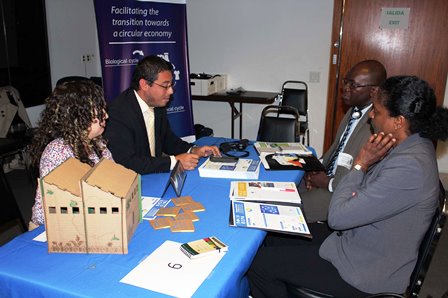
 The forum showcased the experience of 10 ECPA implementing organizations, which through collaborative efforts have leveraged support from governments, international organizations and NGOs in projects that address energy challenges facing the countries of the Americas. Close to 50 participants attended the dialogue, including government officials, academic and civil society representatives, and energy and climate practitioners, focused on alternatives for enabling collaborative actions based on voluntarism, joint resource commitment and shared duties for addressing common energy challenges.
The forum showcased the experience of 10 ECPA implementing organizations, which through collaborative efforts have leveraged support from governments, international organizations and NGOs in projects that address energy challenges facing the countries of the Americas. Close to 50 participants attended the dialogue, including government officials, academic and civil society representatives, and energy and climate practitioners, focused on alternatives for enabling collaborative actions based on voluntarism, joint resource commitment and shared duties for addressing common energy challenges.
Peru and France—host countries of the upcoming United Nations Conference on Climate Change, COP20 (Lima, 2014) and COP21 (Paris, 2015)—participated in the opening of the forum. Ambassador Juan Federico Mayor Jimenez, Permanent Representative of Peru to the OAS stressed the importance of government involvement in this area, noting that “the use of renewable energy […] has a promising future. The States that recognized this future early on and have adopted public policies to stimulate and support research and development of these energy sources have experienced a dramatic increase in the share of renewable energy sources in their energy mix.”
Ambassador Jean-Claude Nolla, Permanent Observer of France to the OAS recognized that “climate change is the greatest challenge that human society has to face—a challenge that impacts almost all other challenges.” Nolla stressed that “the government of France has two convictions; the first is that only an ambitious and universal agreement will allow a transition to a low carbon global economy. The second is that to reach this agreement, we need a positive dynamic with the participation of all stakeholders.”
In remarks presented on behalf of Executive Secretary of the Secretary for Integral Development of the OAS, Cletus I. Springer, Director of the Department of Sustainable Development agreed with Ambassador Nolla noting that “The challenges of energy and climate are global. Addressing them successfully requires everyone’s engagement. Through partnerships, collaboration, and human ingenuity above all, we can find solutions to those challenges” concluded.


It is precisely this recognition for the need of multi-stakeholder partnerships and collaboration that render these types of dialogues necessary. Yet, the ECPA Clearinghouse forum was by no means a typical dialogue. The forum followed a dynamic and innovative format, stationing project implementers in tables throughout the room, where they provided brief presentations to small groups of participants—many of them from Permanent Missions representing member States—who rotated from table to table, allowing for more intimate interactions between the audience and project implementers.
“Through this format we wanted to get away from the lineal and many times heavy 10-power point approach to the dialogue. Instead, we turned to a more dynamic ‘rotational’ format that kept everyone on their feet and supported participant engagement and interaction with project implementers” explained Alejandra Henao, team member of the OAS ECPA Clearinghouse who supported the organization of the forum. Mathias Vuille implementer of the ‘Andean Climate Change Inter-American Observatory Network (ACCION)’ from the Department of Atmospheric and Environmental Sciences at University at Albany, SUNY, New York, described the forum as “very insightful” stressing the value of the discussions held with the different participants visiting his table.

This is the second in a series of four public discussions forums organized by ECPA, geared toward fostering energy and climate change dialogue and knowledge exchange by member states. Upcoming forums will focus on the impact of natural gas resources on North America’s energy future, and current climate change adaptation strategies.
Source: Executive Secretariat for Integral Development (SEDI) News
 View Map
View Map